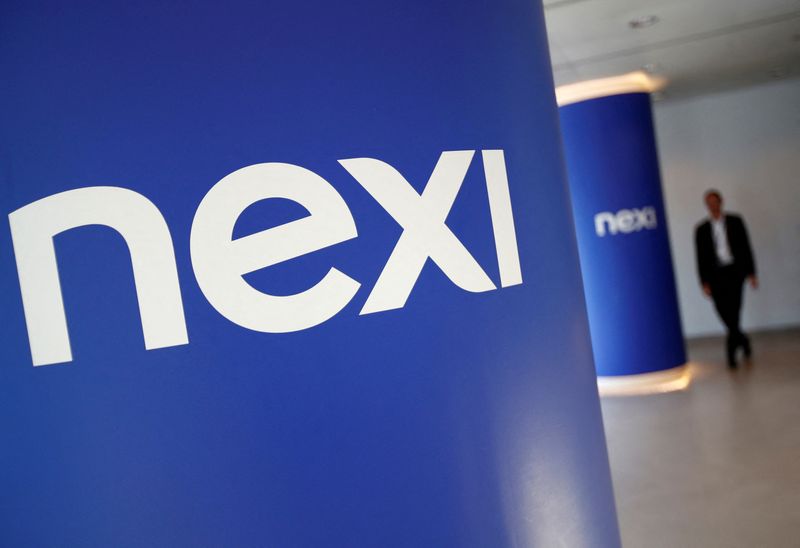By Elizabeth Howcroft
LONDON (Reuters) - A bleak economic outlook and tougher regulatory scrutiny are proving a final straw for investors in European payments company stocks, with signs some are giving up on the industry.
Sector valuations, which ballooned during the COVID-19 pandemic as the market for digital financial services boomed, have since slumped as markets have re-appraised their outlook.
The latest selling bout saw Worldline's shares drop by 59.2% on Wednesday after the French payments firm posted below expectation third-quarter revenue, cut its full-year targets and said it was dropping some merchants to reduce crime risks.
In a wild week for the sector, Worldline's warning sparked a further sell-off, with competitors such as Italy's Nexi (BIT:NEXII) and London-listed CAB Payments also hit.
"It's clearly investors giving up," said Paul Charpentier, equity research analyst at Bryan Garnier, referring to Worldline's sharp drop, which he said showed they had "lost patience" with the company.
Worldline, whose shares were up 6% on Thursday, did not immediately respond to a Reuters request for comment on the stock price decline, but had said in a statement on Wednesday that the environment was "temporarily challenging".
U.S. stocks, already hit hard by 2022's tech stock rout, have suffered too, with Wednesday's wipe-out seeing some spillover into firms such as PayPal (NASDAQ:PYPL), Upstart (NASDAQ:UPST) Holdings, Block and Affirm Holdings (NASDAQ:AFRM).
Worldline's stock slide, which saw around $4 billion wiped off its market value, is the latest wake-up call.
Investors had already seen Adyen (AS:ADYEN)'s market value, which peaked at 84.2 billion euros ($89 billion) in 2021, plummet by around 18 billion euros in a single day in August after weak earnings.
COMMISSIONS CUT
Revenue growth has suffered at payments firms as inflation has force European consumers to spend less, while investors fret about the euro zone slipping into recession.
Some analysts say payments firms have also been caught napping, after a period of growth during COVID lockdowns.
"Companies have been too slow to adapt to the post-pandemic normalization," Jefferies equity analyst Hannes Leitner said.
"A lot of the trends seen in the pandemic ... those trends are not as sustainable as everybody thought," Leitner added.
Another factor piling pressure on valuations is competition from newer entrants such as Stripe, Block and SumUp, which Charpentier said can more easily cut their commission to gain or retain market share, as well as from more established rivals.
"The market is probably currently pricing a vicious cycle where you have prices going down," he said.
In a further sign of investor wariness, venture capital investment flows into European payment firms have also dried up.
They fell to $2.4 billion in 2022, down from $3.8 billion in 2021, PitchBook data shows and with two months left until the end of the year, 2023 has seen just $542 million.
Several banks have also turned cautious on their payments exposures, with Barclays exploring the sale of a stake in its British payments arm, Reuters reported in September.
Italy's Intesa Sanpaolo (OTC:ISNPY) said last year it was selling its 5.1% stake in Nexi and Spain's Banco Sabadell agreed to sell its payments business earlier this year.
'SENSITIVITY'
Payments firms in Europe have been under intense scrutiny since the 2020 collapse of Wirecard, which has resulted in what Leitner said was an "increased sensitivity".
Last month, Germany's financial regulator said it had banned a Worldline joint venture from doing transactions for some customers, citing in a statement on its website "grave deficiencies in money laundering prevention".
"We think this development has left outstanding questions and concerns amongst investors," Morgan Stanley analysts said in a note on Wednesday.
A spokesperson for Worldline said in an email that the company is committed to "integrity and compliance" and wants to "anticipate payment industry threshold and regulatory trends".
"We are regularly audited by regulators and have never been subject to compliance fines," the spokesperson said.
Worldline said on Wednesday it was cutting ties with merchants worth up to 130 million euros in run-rate revenues in response to the increased costs of monitoring them for cybercrime and the due diligence.
'PICKY'
While large-scale market consolidation had previously driven interest in the sector, this has been slowing in recent quarters, Bryan Garnier's Charpentier said.
"Investors are becoming a bit more picky," he added.
Berenberg analysts said in a note that while Worldline has M&A opportunities that will help it expand its geographic coverage and improve its ability to serve merchants in Europe, a key risk is that it could "acquire low-quality companies that dilute its growth and margin expansion potential".
A $17.6 billion write-down this year by U.S. banking and payments processing conglomerate Fidelity National Information Services on its $43 billion acquisition of card payments provider Worldpay in 2019 has also left scars on the sector.
Now, it may leave private equity investors to pick up the pieces for payment service firms, analysts said.

A potential deal targeting Nexi is one of several options being studied by CVC Capital Partners, but the private equity firm is not preparing to file an offer, a source close to CVC told Reuters last week.
($1 = 0.9482 euros)
